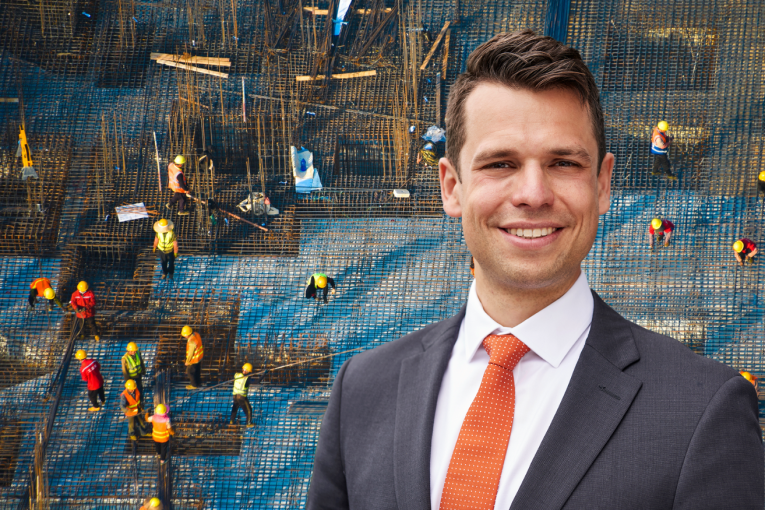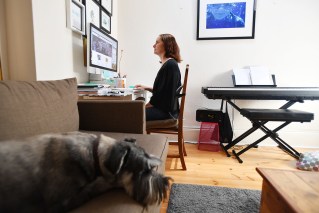One man’s career change inspires the world
Denis Smith’s inspirational story of ditching his hellish work as a salesman for photography comes with a warning; it may cause you to quit your job too.
A short documentary on Mr Smith’s life posted on Vimeo in 2011 inspired people around the world to quit their day jobs, a reaction that was alarming to the entrepreneur.
“At the end of the documentary you [unintentionally] have the perception I’ve stopped working and become this wondrous photographic guru when in fact that wasn’t the case, I was still working,” Mr Smith said.
“I was getting dozens of people saying ‘Denis, I’ve done it, I’ve quit my job’ and I really quickly had to start doing interviews and blog posts saying don’t do it.
“You can’t just walk away from your job, there has to be some planning.”
Mr Smith had moved to South Australia after finding himself in a downward spiral with depression and debt in his high-pressure sales job in Auckland.
He started photography as a “healthy thing to do with my new spare time”, including the original “ball of light”, and his life changed.
When the documentary by Sam Collins was made, the publicity – it has been viewed more than 250,000 times – allowed him to follow his dream, but he has just now finished his first year as a full-time freelance photographer.
It took years of planning, strategising and making sure it was the right move before Mr Smith took the plunge.
He had developed his niche with the unique “ball of light” light painting in his photographs and was able to turn that profile into a commercial photography business – Denis Smith Photography.
So before his story has you running into your boss’s office to resign, here’s how to turn your passion into your day job.
Ask yourself: Why?
It took Mr Smith years to transition from a professional job to freelancing, with his ultimate motivation being a simpler, happier lifestyle.
Kate James, a business and life coach at Total Balance, says that you must be sure you want to turn your passion into a job – and look at what will fill that gap.
“Before I started business coaching, I looked at all the things I wanted to do and one of them was cooking, and it quickly got to the point where I realised if I turned that into a job what will fill that hole?”
John Varvarigos, managing director at Naked Business Consulting, said that you must be sure you know why you are making the leap to “give you heart when things might not be going your way”.
“We all hear the story money just keeps the score but there is fundamentally something deeper than that, and you’ve got to tap into what is intrinsically motivating the entrepreneur to start that business.”
Research
Baking muffins in your spare time might be fun, but doing it day in day out is a different matter – and the same principle applies for other creative careers, too.
Ms James recommended interviewing people who are doing something similar to “find out what’s it really like”.
“Sometimes we have preconceived ideas what it’s like to work in a field of passion, but the reality is quite different.”
Plan, plan, plan
If you are set on starting, the experts agree that the most important thing you need to do is create a business plan.
“You have to do it, you have to have a business plan, you have to have a marketing plan, you’ve got to be super structured, I spend one day a week doing nothing but administration, marketing and planning,” Mr Smith said.
Mr Varvarigos agreed success would only come from having a “really strong plan”.
“You need a business plan to say what are the sales targets, what it will cost to produce, how is it going to work.”
While business consulting services such as Naked and Total Balance help entrepreneurs to start their business, advice is also available from a range of other sources. These include courses at TAFE, government agencies and small business peak bodies.
It might go bad
Naked’s Mr Varvarigos said that it’s wise to be optimistic, but realistic, as it’s not uncommon for start-ups to fail in their first year.
As part of initial planning he looks at the margin for error.
“The level of risk involved is quite high and the reason why a large number of business fail is because they haven’t considered their risk profile even if they don’t make a single sale.”
He suggests having a contingency plan for what to do when things are going wrong, even if it’s as simple as focussing more on aspects of the business like marketing.
It’ll also help to have a buffer. When starting full-time as a freelancer, Mr Smith had savings to fall back on to support his 14 year-old daughter and mortgage.
“I look back now over the past 12 months and my absolute saving grace was the fact that the in lean months, which you have when you’re experimenting and making marketing plans, you have some back-up.”
Who’s buying your dream
Once you set out your plan, your family’s probably convinced it’s a great idea – but who else is going to support you?
Mr Varvarigos said his “unambiguous first advice” is to to have identified your first 20 prospects that would potentially buy your product.
“If you can’t name them, then go back to the drawing board.
“In home-based services you need your first 20 identified before you start, because that will provide you with the cash flow to invest in things like marketing and growth.”
Passion means marketing and accounting
While taking photos is his passion, Mr Smith says it takes up just 25 per cent of his business.
He is unapologetic about the other skills needed to successfully freelance, arguing that you must be a successful marketer as well as competent at book-keeping and sales.
“I think the thing that surprised me, was [the need to] focus a bit more on the business side of things such as marketing and seeking out new business,” Mr Smith said about his first year.
“If you don’t develop high quality, high intensity skills in basic business areas, you will fail.”
Kate James also ensures that her clients understand they will need to wear “different hats”.
“I think it’s important to look at where you are not naturally strong and work out where you are going to get support.
“I had a client who said, ‘I’m going to create a website but English is not my strength and I’m not a good writer,’ and it would be crazy for him not to acknowledge that and outsource it.”
Start-up still means professional
Ms James is also emphatic that start-ups need to be professional and to have systems in place.
“You must systemise your work flow. What happens when a client calls? Do you capture their details, do you have a database, do you have a follow up process?”
Mr Smith has a similar approach. He tackled his business in the same way he did his sales role.
“Because I spent so long in sales I treat it like a sales role, so, for example, pipeline: Can I tell where the business is coming from three months from now?
“People aren’t always thinking about where the next three months work is coming from.”
Patience is also a business virtue
After all that planning and promoting, entrepreneurs must tackle the dark art of patience.
Naked’s Mr Varvarigos said people under or over estimated how much others would want a product or service.
“People believe there’s a huge opportunity but the length of time and resource to make that happen is usually underestimated.
“You’ve got big business like Facebook and Twitter, but they are a drop in the ocean, they are not the norm.”
Ball Of Light from Sam Collins Media and Denis Smith Photography on Vimeo.








